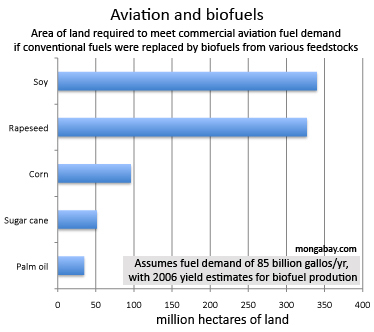Air travel may be powered by biofuels in 3-5 years
Air travel may be powered by biofuels in 3-5 years
mongabay.com
October 27, 2008
|
|
Boeing says biofuel-powered planes are only three-to-five years away from being a reality, reports The Guardian.
“The certification will happen much sooner than anybody thought,” Darrin Morgan, Boeing’s director of environmental business analysis, told the newspaper. “We are thinking that within three to five years we are going to see approval for commercial use of biofuels – and possibly sooner.”
Morgan said that while future jets will be capable of running on biofuels, supply is not expected to keep pace. Commercial aviation consumes 85 billion gallons of kerosene per year. Meeting that demand with conventional biofuels would require millions of hectares of farmland at a time when the world is grappling with hight grain and oilseed prices.
Environmentalists say agricultural expansion for the production of biofuel feedstocks is driving habitat destruction around the world as well as driving up food prices. New demand from aviation will compound the situation, says Friends of the Earth.
 Estimated area of land required to replace fuel demand from commercial aviation with biofuels produced from various feedstocks (soy, sugar cane, palm oil, corn, rapeseed/canola). |
“There are real doubts over whether biofuels are sustainable and make a real contribution to cutting climate-change emissions,” Tony Bosworth, a transport campaigner at Friends of the Earth, told The Guardian. “Second-generation biofuels are also, as yet, unproven.”
Nevertheless Boeing believes a 30 percent blend of biofuel as a way to reduce greenhouse gas emissions. Last month the aircraft-builder joined an industry-led initiative to develop sustainable biofuels. Participants in the scheme pledge “to consider only renewable fuel sources that minimize biodiversity impacts: fuels that require minimal land, water and energy to produce, and that don’t compete with food or fresh water resources,” according to a statement from Boeing. Sustainable biofuels must offer lower lifecycle emissions than kerosene-based fuel and feedstock production “must provide socioeconomic value to the local communities.”
Aviation accounts for 2-3 percent of emissions from fossil fuel use.
Dan Milmo. Biofuel flying will take off in three years, says Boeing. The Guardian, Monday October 27 2008